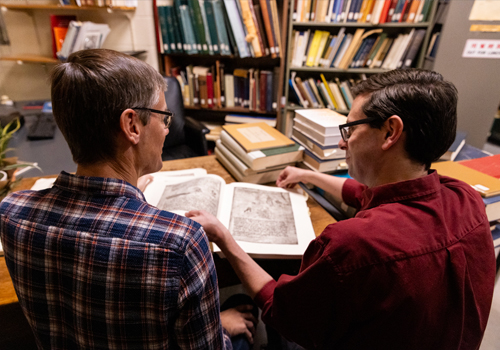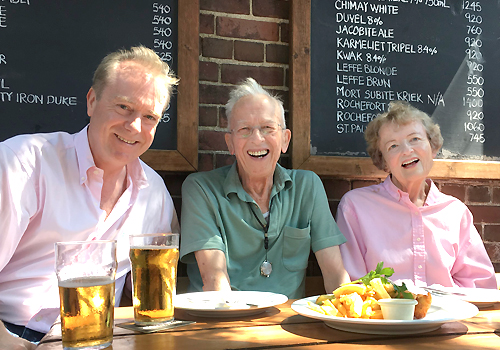Cystig. Gyfol. Rūmheort. These Old English words were used to refer to generous people, like the many passionate donors who have supported the Dictionary of Old English (DOE) for decades.
The DOE, an ambitious academic endeavour at the Faculty of Arts & Science, defines the first six centuries (600-1150 CE) of the English language based on surviving texts from the era, including words written on parchment, carved in stone, or inscribed on jewelry. Started in the late 1960s, the project has moved from microfiche to CD-ROM to its current form online.
“One thing that never ceases to amaze me is that from the very beginning, and for more than 50 years now, the DOE has received generous support from donors year after year to see the project move forward. I think it's impressive,” says Fabienne Michelet Pickavé, associate professor at the Centre for Medieval Studies and a DOE steering committee member.

The DOE complements the Middle English Dictionary (which covers the period 1100-1500 CE) and the Oxford English Dictionary (OED), the three together providing a full description of English vocabulary. The editors of the OED frequently consult the DOE editors when questions arise about the early history of a word, and scholars worldwide use the DOE to inform their own research.
“The DOE is Canada’s most important and lasting scholarly contribution to the history of English,” says Roberta Frank, professor emerita at Yale University and a key driver of the DOE’s fundraising and legacy campaigns. “I was there at the very beginning of the Dictionary of Old English, and I promised its founder, Angus Cameron, in his last days that his vision for the project would come to pass.”
Individual donor support continues to be integral to the DOE’s success, including gifts from lifelong champions of the project, George and Jennifer Rigg.
University Professor Emeritus George Rigg taught Latin and medieval English at U of T over parts of five decades and was involved with the DOE since inception. George and his wife Jennifer, an accomplished author and poet, were close friends of Cameron, who died in 1983. Like Frank, the Riggs promised Cameron they would push the DOE to the finish line. The couple were loyal donors and George regularly engaged with the editors until his death in 2019. Jennifer died a few years later, leaving a planned gift of $500,000 to fund the George and Jennifer Rigg Editorship.
The Riggs’ nephew Rupert Hope has many treasured memories of his Uncle George and Aunt Jennifer. From the age of six months, George spoke to baby Rupert in Old English, and made up many stories with his nephew’s stuffed animals as the main characters, named after medieval kings and queens. Hope says the DOE will always be the legacy of George and Jennifer.
"Their consistent giving and the founding of the editorship helped them leave something that would survive them and subsequent generations and contribute to academic study in the fields which they both absolutely loved,” says Hope.
“George and Jennifer were amazingly spiritual and generous characters.”

Today’s DOE co-editors are U of T alumni and George’s former students — Robert Getz (current holder of the Rigg Editorship) and Stephen Pelle are assistant professors at the Centre for Medieval Studies. They recall the brilliant and lovingly eccentric George Rigg, saying he never turned down a meeting and always arrived on time, even if he was difficult to get a hold of.
“You could only reach him on his landline after 10 p.m.,” says Getz. “He never owned a computer, and he published books, but they were all typewritten, and then they had to be electronically input by someone else.
“But he was kind to his students, generous and very helpful.”
From the project’s inception, working through the 22 letters of the Old English alphabet has been a labour of love requiring a particular skillset. The team is a little more than halfway done, currently putting the finishing touches on the first set of entries for the letter L. The team's rate of progress through the rest of the alphabet will depend on how many drafting editors they can afford to retain.
Because of the detailed attention paid to every entry, DOE Managing Editor and U of T alum Catherine Monahan explains, it can take several years to complete each letter. “The support we get from donors makes a huge difference,” she says.
Arts & Science recently celebrated the commitment of DOE donors by matching all new donations dollar-for-dollar. The goal was exceeded.
Pelle explains individual donors are more important than ever for the success and completion of the DOE. The team is determined to move forward.
“I'll be happy if, once the DOE is complete, it remains a reliable research tool for scholars in the field for a long time and can help people answer questions about Old English,” he says.
The Dictionary of Old English is on track to be completed by the 2040s. Are you interested in supporting the DOE or adopting a word? Donate directly to the DOE online or contact Associate Director, Development Niamh Earls Hallworth at niamh.earls@utoronto.ca.

